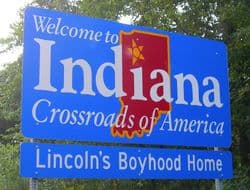Governor Mike Pence of Indiana has, along with a group of apologists on the right, gone to great lengths to assure the public that his state's right-to-discriminate law is no different than the federal Religious Freedom Restoration Act (RFRA). That is an odd position to take for several reasons.
 First, it's not true. There are obvious textual differences. Still, we have to be honest about the fact that through judicial interpretation, the federal RFRA has bloated to the point where it is nearing the explicit and astounding breadth of Indiana's version. So, maybe it's not the differences that we should be worried about.
First, it's not true. There are obvious textual differences. Still, we have to be honest about the fact that through judicial interpretation, the federal RFRA has bloated to the point where it is nearing the explicit and astounding breadth of Indiana's version. So, maybe it's not the differences that we should be worried about.
Second, the words don't match the actions. While averring that Indiana's RFRA just copies its federal cousin, Governor Pence is also asking his state's legislature to amend the law to clarify that it is indeed no different than the federal RFRA. That begs the question: if it's already the same, why does it need to be fixed to make it the same.
And, third, it really misses the point. We shouldn't be satisfied with a state RFRA that is in fact identical to the current interpretation of the federal RFRA because we shouldn't be satisfied with the current interpretation of the federal RFRA. That people started to notice the problem when Indiana made its bigotry explicit is, in a sense, a silver lining. But the wolf has been hiding in sheep's clothing for some time.
So what's really in Indiana's right-to-discriminate law? That's what this column is about. But we will also see that it isn't so much the textual differences as much as the timing and boldness of Indiana's bigotry. Make no mistake: this law is about us, and it is about allowing individuals to discriminate against us on the pretextual and undemocratic basis of their personal religious beliefs. The law is animated by animus toward gays, dolled up in the language of religious freedom. And that's what makes it so dangerous.
CONTINUED, AFTER THE JUMP…
Indiana's RFRA differs from the text of the federal RFRA in three important ways:
First, Section 7.3 explicitly protects the exercise of religion, and religion-based discrimination, by companies and corporations, not just individuals. Nor does Section 7.3 explicitly limit the right to closely-held corporations, or those owned by a single individual or a family.
 This seems to create a giant chasm between Indiana's and the federal RFRA. But remember that in Hobby Lobby, a majority of the Supreme Court extended the federal RFRA to closely-held corporations, so a provision that permits corporations to use religion as a pretext to discriminate is not so new. Also, Section 7.3 does limit the reach of the law to corporations where "individuals" with a "system of religious beliefs" have "control or substantial ownership" of the company. Corporations that fit that description usually turn out to be closely-held corporations.
This seems to create a giant chasm between Indiana's and the federal RFRA. But remember that in Hobby Lobby, a majority of the Supreme Court extended the federal RFRA to closely-held corporations, so a provision that permits corporations to use religion as a pretext to discriminate is not so new. Also, Section 7.3 does limit the reach of the law to corporations where "individuals" with a "system of religious beliefs" have "control or substantial ownership" of the company. Corporations that fit that description usually turn out to be closely-held corporations.
But that need not be the case. Indiana's statute could also apply to a public company where the majority shareholder has a system of religious beliefs that compel him to take the public company in a particular direction. That is not in the federal RFRA. Nor was it included in Hobby Lobby. Still, this isn't as big a difference as it sounds: there just aren't many (if any) public corporations run by a majority shareholder who is also a religious zealot, but the law could have the unintended consequence of allowing such shareholders to decide–against all good business sense–to discriminate against gays.
Second, Section 9 of the Indiana RFRA protects persons "whose exercise of religion has been substantially burdened, or is likely to be substantially burdened" by government action. The is likely to be language does not appear in the federal RFRA; under that law, your religious beliefs have to actually be burdened to give you standing to bring the lawsuit. The effect of the added language in Indiana's RFRA is to open the door to litigating the right to discriminate earlier.
It's clear to me from this provision that a litigator, or former litigator, may have been involved in writing this statute. The is likely to language tracks the standard we use for a "preliminary injunction," or an order by a court to stop something, in this case, a law that burdens free exercise of religion rights, from taking effect. We grant preliminary injunctions when, among other things, a party can show a "likelihood of success on the merits." So, it seems that the Indiana RFRA is explicitly codifying the preliminary injunction language into the statute. This has the effect of giving potential discriminators more weapons. That's definitely bad, but it's a little arcane.
The third difference is the most important. Unlike the language of the federal RFRA, Indiana's law explicitly provides for a defense in a private discrimination suit. The federal RFRA was passed as a weapon for individuals to protect themselves against federal laws that impinge their right to exercise their religion freely. The Indiana law doesn't just offer a weapon against state laws; it also is a weapon to protect Mary Sue Cakebaker in a lawsuit brought by Abbi and Ilana when Mary Sue refuses to serve them before they are lesbians.
 This is why Indiana's law is a license to discriminate. It is a shield for bigots, not a shield against government encroachment.
This is why Indiana's law is a license to discriminate. It is a shield for bigots, not a shield against government encroachment.
But if you look at the law in the Second, Eighth, Ninth, and DC Circuits, you will find appellate court holdings that the federal RFRA does the same thing. Then-Judge Sotomayor dissented from the Second Circuit's decision in Hankins v. Lyght (2006) finding a private lawsuit defense in the federal RFRA. The Sixth and Seventh Circuits agreed with Justice Sotomayor and said that RFRA only applies when you're suing the government. Notably, it was Judge Posner who wrote the precedential decision in the Seventh Circuit, tossing, in his unique I've-had-enough-of-this-nonsense way, the litigants' attempt to extend the federal RFRA to purely private actions.
This leaves us with an Indiana law that is clearly different from the federal RFRA, but not as different as some of the heated rhetoric would have you believe. That doesn't mean that the anger is unwarranted. Rather, it should not be solely directed at Indiana, its legislature, its governor, and its bigoted law. We should be angry–and a little bit worried–that the current judicial interpretation of the federal RFRA is so broad that it extends to some corporations, can be invoked pre-injury in the preliminary injunction context, and could be a defense in a purely private lawsuit (depending on where you are).
The real evil of Indiana's RFRA is two-fold. Its timing, coming on the heels of marriage equality victories in an avalanche of states in anticipation of a likely victory at the Supreme Court and coming so soon after business owners in Washington and Colorado and elsewhere have tried to refuse service to gays because their religions ostensible require hatred and bigotry, clearly suggests that it was born out of animus and targeted, in purpose and effect, at the gay community.
But it is the second evil in the Indiana law that should leave us shaken. Though so obviously motivated by animus and so obviously targeted at us, the law is couched in the far more palatable language of religious freedom. This makes all RFRAs wolves in sheep's clothing, not just Indiana's. They have a built in persuasive message and a built in constituency, several of whom sit on the Supreme Court.
We may win "clarifications" of Indiana's RFRA to make it more like the federal RFRA. That's not a victory. In fact, it's much more dangerous: it implies that the federal RFRA is a good thing that we're willing to accept. It isn't and we shouldn't.
***
Follow me on Twitter and on Facebook.
Ari Ezra Waldman is a professor of law and the Director of the Institute for Information Law and Policy at New York Law School and is concurrently pursuingWhat his PhD at Columbia University in New York City. He is a 2002 graduate of Harvard College and a 2005 graduate of Harvard Law School. Ari writes weekly posts on law and various LGBT issues.



